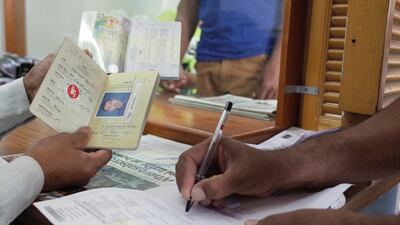Foreign workers will be allowed to sponsor family members based on income rather than profession under the latest changes to the UAE’s residency rules.
The UAE Cabinet yesterday said the decision is aimed at "enhancing family stability of foreign workers and social cohesion, as well as attracting highly skilled workers".
At present, a resident can sponsor family members if they meet certain criteria, including a “managerial” title.
Non-professionals and those who are skilled workers rather than degree holders do not necessarily meet the criteria to sponsor their families.
The Cabinet said that would change, although it did not set out how much a resident would have to earn to bring their family to the country.
Salary is currently taken into account when sponsoring a relative, but the minimum for a man is Dh4,000 or Dh3,000 plus accommodation. For a woman to sponsor her children, she must earn Dh10,000.
By making income one of the criteria instead of profession, the law has become more inclusive to cover not just professionals but skilled workers.
The Cabinet called on relevant government departments “to conduct studies to assess and enhance the services provided to residents, including aspects of education and health, and encourage the active participation of their family member in the job market as an alternative to recruiting new workers from abroad, within the existing policies and regulations,” state news agency Wam reported.
Details are expected in the coming weeks, officials said on Sunday.
Barney Almazar, a director at Gulf Law who deals with immigration issues, said the move is likely to mean more foreign workers will be eligible to sponsor their families.
“By making income as one of the criteria instead of profession, the law has become more inclusive to cover not just professionals but skilled workers as well," he said.
“It is not uncommon that skilled workers, having years of experience, have been promoted to higher salary grades but cannot obtain a managerial position stamped on their visa due to lack of educational degree.
“Now, they may be able to sponsor their families as they can demonstrate their ability to support their dependents based on their income.
“Working on a foreign land is already difficult. But being with your family makes it worthwhile.”
The development is the latest in a series of changes to the visa system in the past year and follows a 2018 cabinet decision to relax rules in offering 10-year visas to some professionals.
Key workers like those in science, research and medicine were among a list of executives and entrepreneurs offered the opportunity to extend residency visas, as the nation shifts towards a more knowledge-based economy.
Keren Bobker, senior partner at Holborn Assets who covers personal finance and government regulations in her column for The National, said the cost of sponsoring a family member is expected to remain low.
“It seems to be intended to be fairer than the current rules as it should not exclude any occupations,” she said.
“Under the previous rules domestic workers were not able to sponsor family members but most of these workers will have relatively low salaries, so may not have the means to do so.
“A further complication is where a domestic worker lives in their employer’s home but there may be cases where the employer may wish to employ both husband and wife, so this could work.”


